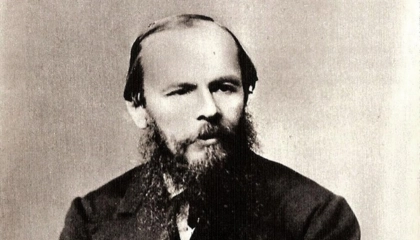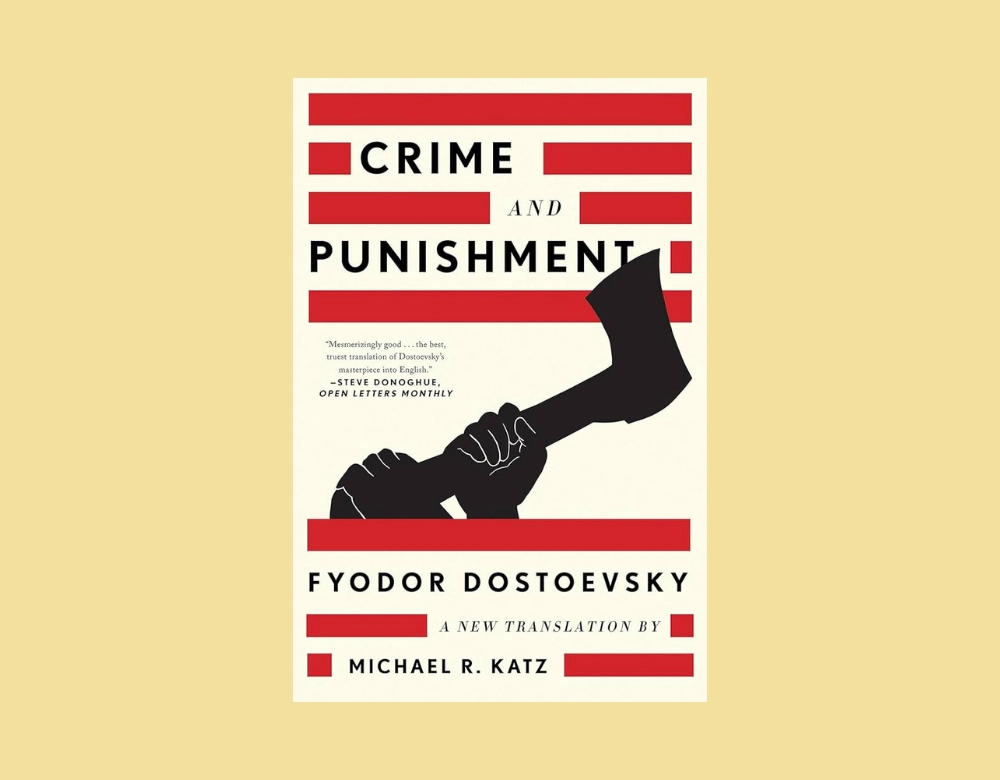Fyodor Dostoevsky: The Gambler, The Convict, and The Psychologist
So, Fyodor Dostoevsky. This dude’s life was totally insane, making his books feel totally authentic and raw. Born in 1821, he wasn’t just some philosopher; he was a revolutionary arrested for anti-government activity, sentenced to death by firing squad, and then at the last second had his sentence commuted to hard labor in Siberia. That whole experience the trauma of the faux execution, the four years in a prison camp did not just shape his writing; it became his writing. He knew psychological suffering, man.
- When It Happened: Crime and Punishment was published in 1866, shortly after his time in exile and when he was totally buried in debt (he was a compulsive gambler, seriously). The desperation and moral chaos of the main character, Raskolnikov, totally mirrors the chaos of Dostoevsky’s own life.
- Genre: It’s the ultimate Psychological Thriller and a Philosophical Novel. The real action isn’t the murder; it’s the intense, internal collapse of Raskolnikov’s mind after the crime.
The Philosophical Engine: The Test of the “Extraordinary Man”
Dostoevsky’s core philosophical drive here is a massive, crushing critique of the Nihilistic and Utilitarian ideas of his time specifically, the totally arrogant notion that certain “extraordinary men” are morally justified in committing crimes for the “greater good.”
The novel is basically a psychological experiment designed to demolish Raskolnikov’s Theory, which is the worst idea ever.
| Core Philosophical Theme | What it Means (The Gist of It) |
| The “Superman” Theory | Raskolnikov thinks he’s a Napoleon an “extraordinary man” who can step over conventional morality (i.e., murder an old pawnbroker) to achieve a higher purpose. Dostoevsky shows this is pure, horrifying self-deception. |
| Guilt as Punishment | The punishment for the crime isn’t the police or Siberia; it’s the psychological annihilation that Raskolnikov suffers immediately after the murder. His own mind is the ultimate, worst prison. |
| Suffering and Redemption | Dostoevsky believed (strongly, thanks to his faith and prison time) that true spiritual rebirth only comes through profound suffering. Sonya Marmeladov, the pure-hearted prostitute, embodies this path to redemption through self-sacrifice. |
| The Conflict of Ideas | The novel is packed with incredible, long, philosophical debates (especially with the detective Porfiry Petrovich) that aren’t about facts; they are brutal clashes between competing worldviews. It’s philosophy as a street fight. |
Required Reading: Why Dostoevsky is the Ultimate Psychologist

Why University Students Must Endure This Intense Book
If you’re studying psychology, existential philosophy, moral ethics, or Russian literature, Fyodor Dostoevsky’s Crime and Punishment is absolutely mandatory reading. It is the ultimate literary deep dive into the human psyche, and it established the standard for the modern psychological novel.
It is absolutely crucial for students because:
- Psychological Realism: The novel is a chilling manual on how guilt, paranoia, and alienation work. Dostoevsky tracks Raskolnikov’s fever dreams, irrational decisions, and physical collapse with total, terrifying accuracy.
- Moral Debate: It forces students to confront the most difficult ethical problems: Does the end ever justify the means? What is the limit of individual freedom? This is crucial for moral development.
- Thematic Resonance: It provides the foundation for much of 20th-century existentialism and philosophy (think Nietzsche and Camus). Understanding Raskolnikov helps you understand the concept of the individual struggling against a meaningless, arbitrary world.
What to Read Next: Further Deep Dives into the Russian Soul
Once you’ve finished Raskolnikov’s long, agonizing confession, you’ll definitely want to explore other works that share Dostoevsky’s intense psychological focus and complex theological debates.
| Recommended Reading | The Direct Connection to Dostoevsky’s Themes |
| The Brothers Karamazov (Dostoevsky) | His final, longest masterpiece. It focuses on patricide and theological/philosophical debate, again centered on the question of God, morality, and individual guilt. It’s the philosophical successor to Crime and Punishment. |
| Notes from Underground (Dostoevsky) | A much shorter work that is a rant by the “Underground Man” a bitter, alienated intellectual. He is the ultimate, cynical precursor to Raskolnikov’s intellectual arrogance. It’s pure, condensed anti-hero fury. |
| The Stranger (Albert Camus) | A 20th-century French novel that explores similar themes of arbitrary murder and alienation, but from the perspective of Absurdism. It offers a fascinating contrast to Dostoevsky’s more religious path to redemption. |
When a Book Becomes a Nightmare: Crime and Punishment’s Stage Life
The Theatrical Power of Confession and Psychological Collapse
The influence of Crime and Punishment on drama is huge because the core of the story is an ongoing, intense psychological conflict that plays out in claustrophobic, dirty rooms and public squares. The central dramatic tension isn’t who did it (we know that right away), but will he confess? That creates incredible, internal suspense.
It set a standard for dramatic adaptations that prioritize intense, sustained dialogue (the interrogations) and a focus on the actor’s ability to convey profound mental anguish and paranoia.
- On Direction: Directors often use totally tight, close-up shots (in film) and cramped, oppressive sets (on stage) to mirror the suffocating psychological pressure Raskolnikov is under. The physical space reflects his mental state.
- Performance: The actor playing Raskolnikov has a monstrous task: portraying a genius driven to a totally insane act, then showing his slow, agonizing breakdown. The performance hinges on displaying the profound split between his arrogant intellect and his total emotional failure.
Key Adaptations: Crime and Punishment Across Media
The story’s intense focus on character and dialogue means it’s constantly being revisited, even if the result is often just as heavy as the book.
| Adaptation Type | Key Example/Details | Why It’s Famous/Relevant |
| The 1935 Film (Hollywood) | Directed by Josef von Sternberg. A very early, simplified take on the material. | Showed that the core plot the murder, the guilt, the pursuit by the detective was strong enough for mainstream cinema, even if the philosophy was diluted. |
| BBC Miniseries (2002) | A popular, well-regarded version that allowed time for the novel’s complex supporting characters (Sonya, Marmeladov, etc.) to develop properly. | Proves that the story’s supporting cast and their desperate struggles are just as important as Raskolnikov’s central drama. |
| The Japanese Film Hakuchi (The Idiot) | While officially an adaptation of Dostoevsky’s The Idiot, many directors have borrowed the psychological intensity and moral framework of Crime and Punishment for general thrillers and neo-noir films. | Showcases Dostoevsky’s wide-ranging, non-direct influence on modern cinema’s exploration of guilt. |
Final Thoughts: The Inescapable Call of Conscience
So, we finish our deep, dark dive into Fyodor Dostoevsky’s Crime and Punishment. Why does this book, set in the squalor and intellectual ferment of 19th-century St. Petersburg, still feel so utterly immediate? Because its central argument is eternal: You can violate human law, but you cannot escape the spiritual law of your own conscience.
- Dostoevsky permanently showed us that the intellect, divorced from compassion and morality, is not noble; it is utterly destructive.
- The book’s final, raw message is that the only true path to humanity is not through power or intellectual superiority, but through humility, suffering, and unconditional love (Sonya’s love).
It is a permanent, essential call to abandon arrogance and embrace the messy, difficult, but ultimately necessary path of genuine moral responsibility.

